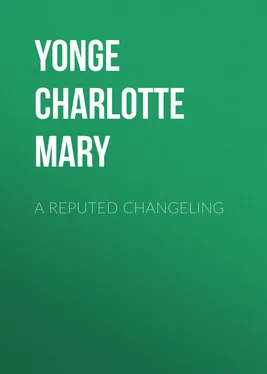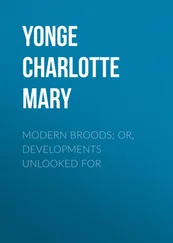Charlotte Yonge - A Reputed Changeling
Здесь есть возможность читать онлайн «Charlotte Yonge - A Reputed Changeling» — ознакомительный отрывок электронной книги совершенно бесплатно, а после прочтения отрывка купить полную версию. В некоторых случаях можно слушать аудио, скачать через торрент в формате fb2 и присутствует краткое содержание. Жанр: foreign_prose, literature_19, Европейская старинная литература, foreign_antique, на английском языке. Описание произведения, (предисловие) а так же отзывы посетителей доступны на портале библиотеки ЛибКат.
- Название:A Reputed Changeling
- Автор:
- Жанр:
- Год:неизвестен
- ISBN:нет данных
- Рейтинг книги:5 / 5. Голосов: 1
-
Избранное:Добавить в избранное
- Отзывы:
-
Ваша оценка:
- 100
- 1
- 2
- 3
- 4
- 5
A Reputed Changeling: краткое содержание, описание и аннотация
Предлагаем к чтению аннотацию, описание, краткое содержание или предисловие (зависит от того, что написал сам автор книги «A Reputed Changeling»). Если вы не нашли необходимую информацию о книге — напишите в комментариях, мы постараемся отыскать её.
A Reputed Changeling — читать онлайн ознакомительный отрывок
Ниже представлен текст книги, разбитый по страницам. Система сохранения места последней прочитанной страницы, позволяет с удобством читать онлайн бесплатно книгу «A Reputed Changeling», без необходимости каждый раз заново искать на чём Вы остановились. Поставьте закладку, и сможете в любой момент перейти на страницу, на которой закончили чтение.
Интервал:
Закладка:
When the meal was over the children were dismissed to the garden, but bidden to keep within call, in case Sir Peregrine should wish to see his nephew again. The others repaired again to the garden seat, with wine and fruit, but the knight begged Mrs. Woodford not to leave them.
“I am satisfied,” he said. “The boy shows gentle blood and breeding. There was cause enough for fright without cowardice, and there is not, what I was led to fear, such uncouthness or ungainliness as should hinder me from having him with me.”
“Oh, sir, is that your purpose?” cried the lady, almost as eagerly as if it had been high preferment for her own child.
“I had thought thereon,” said the envoy. “There is reason that he should be my charge, and my brother is like to give a ready consent, since he is sorely perplexed what to do with this poor untoward slip.”
“He would be less untoward were he happier,” said Mrs. Woodford. “Indeed, sir, I do not think you will repent it, if—” and she paused.
“What would you say, madam?”
“If only all your honour’s household are absolutely ignorant of all these tales.”
“That can well be, madam. I have only one body-servant with me, this unlucky blackamoor, who speaks nothing save Dutch. I had already thought of leaving my grooms here, and returning to London by sea, and this could well be done, and would cut off all channels of gossiping. The boy is, the chaplain tells me, quick-witted, and a fair scholar for his years, and I can find good schooling for him.”
“When his head is able to bear it,” said Mrs. Woodford.
“Truly, sir,” added the Doctor, “you are doing a good work, and I trust that the boy will requite you worthily.”
“I tell your reverence,” said Sir Peregrine, “crooked stick though they term him, I had ten times rather have the dealing with him than with those comely great lubbers his brothers! The question now is, shall I tell him what is in store for him?”
“I should say,” returned Dr. Woodford, “that provided it is certain that the intention can be carried out, nothing would be so good for him as hope. Do you not say so, sister?”
“Indeed I do,” she replied. “I believe that he would be a very different boy if he were relieved from the misery he suffers at home and requites by mischievous pranks. I do not say he will or can be a good lad at once, but if your honour can have patience with him, I do believe there is that in him which can be turned to good. If he only can believe in the better nature and higher guidings, and pray, and not give himself up in despair.” She had tears in her eyes.
“My good madam, I can believe it all,” said Sir Peregrine. “Short of being supposed an elf, I have gone through the same, and it was not my good father’s fault that I did not loathe the very name of preaching or prayer. But I had a mother who knew how to deal with me, whereas this poor child’s mother, I am sure, believes in her secret heart that he is none of hers, though she has enough sense not to dare to avow it. Alas! I cannot give the boy the woman’s tending by which you have already wrought so much,” and Mrs. Woodford remembered to have heard that his wife had died at Rotterdam, “but I can treat him like a human being, I hope indeed as a son; and, at any rate, there will be no one to remind him of these old wives’ tales.”
“I can only say that I am heartily rejoiced,” said Mrs. Woodford.
So Peregrine was summoned, and shambled up, his eyes showing that he expected a trying interview, and, moreover, with a certain twinkle of mischief or perverseness in their corners.
“Soh! my lad, we ought to be better acquainted,” said the uncle. “D’ye know what our name means?”
“ Peregrinus , a vagabond,” responded the boy.
“Eh! The translation may be correct, but ’tis scarce the most complimentary. I wonder now if you, like me, were born on a Wednesday. ‘Wednesday’s child has far to go.’”
“No. I was born on a Sunday, and if to see goblins and oafs—”
“Nay, I read it, ‘Sunday’s child is full of grace.’”
Peregrine’s mouth twitched ironically, but his uncle continued, “Look you, my boy, what say you to fulfilling the augury of your name with me. His Majesty has ordered me off again to represent the British name to the Elector of Brandenburg, and I have a mind to carry you with me. What do you say?”
If any one expected Peregrine to be overjoyed his demeanour was disappointing. He shuffled with his feet, and after two or three “Ehs?” from his uncle, he mumbled, “I don’t care,” and then shrank together, as one prepared for the stripe with the riding-whip which such a rude answer merited: but his uncle had, as a diplomate, learnt a good deal of patience, and he said, “Ha! don’t care to leave home and brothers. Eh?”
Peregrine’s chin went down, and there was no answer; his hair dropped over his heavy brow.
“See, boy, this is no jest,” said his uncle. “You are too big to be told that ‘I’ll put you into my pocket and carry you off.’ I am in earnest.”
Peregrine looked up, and with one sudden flash surveyed his uncle. His lips trembled, but he did not speak.
“It is sudden,” said the knight to the other two. “See, boy, I am not about to take you away with me now. In a week or ten days’ time I start for London; and there we will fit you out for Königsberg or Berlin, and I trust we shall make a man of you, and a good man. Your tutor tells me you have excellent parts, and I mean that you shall do me credit.”
Dr. Woodford could not help telling the lad that he ought to thank his uncle, whereat he scowled; but Sir Peregrine said, “He is not ready for that yet. Wait till he feels he has something to thank me for.”
So Peregrine was dismissed, and his friends exclaimed with some wonder and annoyance that the boy who had been willing to be decapitated to put an end to his wretchedness, should be so reluctant to accept such an offer, but Sir Peregrine only laughed, and said—
“The lad has pith in him! I like him better than if he came like a spaniel to my foot. But I will say no more till I fully have my brother’s consent. No one knows what crooks there may be in folks’ minds.”
He took his leave, and presently Mrs. Woodford had a fresh surprise. She found this strange boy lying flat on the grass, sobbing as if his heart would break, and when she tried to soothe and comfort him it was very hard to get a word from him; but at last, as she asked, “And does it grieve you so much to leave home?” the answer was—
“No, no! not home!”
“What is it, then? What are you sorry to leave?”
“Oh, you don’t know! you and Anne—the only ones that ever were good to me—and drove away— it .”
“Nay, my dear boy. Your uncle means to be good to you.”
“No, no. No one ever will be like you and Anne. Oh, let me stay with you, or they will have me at last!”
He was too much shaken, in his still half-recovered state, by the events of these last days, to be reasoned with. Mrs. Woodford was afraid he would work himself into delirium, and could only soothe him into a calmer state. She found from Anne that the children had some vague hopes of his being allowed to remain at Portchester, and that this was the ground of his disappointment, since he seemed to be attaching himself to them as the first who had ever touched his heart or opened to him a gleam of better things.
By the next day, however, he was in a quieter and more reasonable state, and Mrs. Woodford was able to have a long talk with him. She represented that the difference of opinions made it almost certain that his father would never consent to his remaining under her roof, and that even if this were possible, Portchester was far too much infected with the folly from which he had suffered so much; and his uncle would take care that no one he would meet should ever hear of it.
Читать дальшеИнтервал:
Закладка:
Похожие книги на «A Reputed Changeling»
Представляем Вашему вниманию похожие книги на «A Reputed Changeling» списком для выбора. Мы отобрали схожую по названию и смыслу литературу в надежде предоставить читателям больше вариантов отыскать новые, интересные, ещё непрочитанные произведения.
Обсуждение, отзывы о книге «A Reputed Changeling» и просто собственные мнения читателей. Оставьте ваши комментарии, напишите, что Вы думаете о произведении, его смысле или главных героях. Укажите что конкретно понравилось, а что нет, и почему Вы так считаете.












